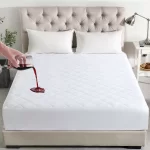A Comprehensive Guide to Choosing the Correct Mattress Protector
When it comes to ensuring a good night’s sleep and protecting your investment in a quality mattress, a mattress protector is an often overlooked but essential bedding accessory. A mattress protector not only safeguards your mattress from spills, stains, allergens, and wear and tear but also enhances your overall sleep experience. However, with a wide range of options available, choosing the correct mattress protector can be a daunting task. In this comprehensive guide, we’ll walk you through the key factors to consider when selecting the perfect mattress protector.
1. Material Matters:
The material of your mattress protector plays a crucial role in both comfort and functionality. Common materials include:
- Cotton: Soft, breathable, and natural, cotton protectors are great for those who prioritize comfort. They are also hypoallergenic and suitable for sensitive skin.
- Polyester: Polyester protectors are durable and affordable. They are often blended with other materials to improve breathability and comfort.
- Jersey Knit: These are stretchy and feel like a soft, t-shirt. They’re comfortable and offer a snug fit.
- Terry Cloth: Known for its absorbency, terry cloth protectors are excellent at repelling liquids and stains.
- Vinyl or Plastic: These are waterproof but less breathable. They are ideal for protecting against spills but may not be as comfortable for sleeping.
Choose a material that aligns with your priorities – comfort, breathability, waterproofing, or a balance of these factors.
2. Size and Fit:
A proper fit is essential for a mattress protector to do its job effectively. Measure your mattress carefully, including its depth, to ensure you choose the right size protector. Most protectors are available in standard mattress sizes (Twin, Full, Queen, King, etc.), but some come with deep pockets to accommodate thicker mattresses or mattress toppers.
3. Waterproof or Water-Resistant:
If you have young children or pets, or if you’re prone to spills, a waterproof mattress protector is a wise choice. These protectors have a layer that blocks liquids from seeping into your mattress. Look for protectors with a waterproof barrier that is also breathable to avoid trapping heat.
4. Allergen Protection:
For those with allergies or asthma, allergen-proof mattress protectors are a must. These protectors have a tightly woven fabric that prevents allergens like dust mites, pet dander, and pollen from getting into your mattress. Look for products labeled as hypoallergenic.
5. Breathability:
A common concern with mattress protectors is that they might make your bed feel hotter. Look for protectors that are designed to be breathable, allowing air to circulate while still providing protection.
6. Ease of Maintenance:
Consider how easy it is to clean your mattress protector. Most can be machine washed, but check the care instructions to ensure it suits your lifestyle.
7. Noise Level:
Some waterproof or plastic mattress protectors can be noisy when you move in bed. If this is a concern, look for options that are designed to be noiseless.
8. Durability:
Invest in a high-quality protector that will withstand regular use and washing. Look for products with good customer reviews and warranties.
9. Additional Features:
Some mattress protectors come with extra features such as temperature regulation, cooling properties, or antimicrobial treatments. Evaluate whether these features align with your specific needs and preferences.
10. Budget:
Lastly, consider your budget. While it’s tempting to opt for the cheapest option, remember that a mattress protector is an investment in the longevity and comfort of your mattress. A slightly higher upfront cost can pay off in the long run by protecting your mattress from damage and extending its lifespan.
In conclusion, choosing the correct mattress protector is a vital decision to ensure both the longevity of your mattress and the quality of your sleep. Consider your specific needs and preferences, such as material, size, waterproofing, breathability, and ease of maintenance, to make an informed choice. With the right mattress protector, you can sleep soundly knowing your mattress is safe and comfortable.
Please visit our website www.coverandprotect for a full range of bedding protection products.




